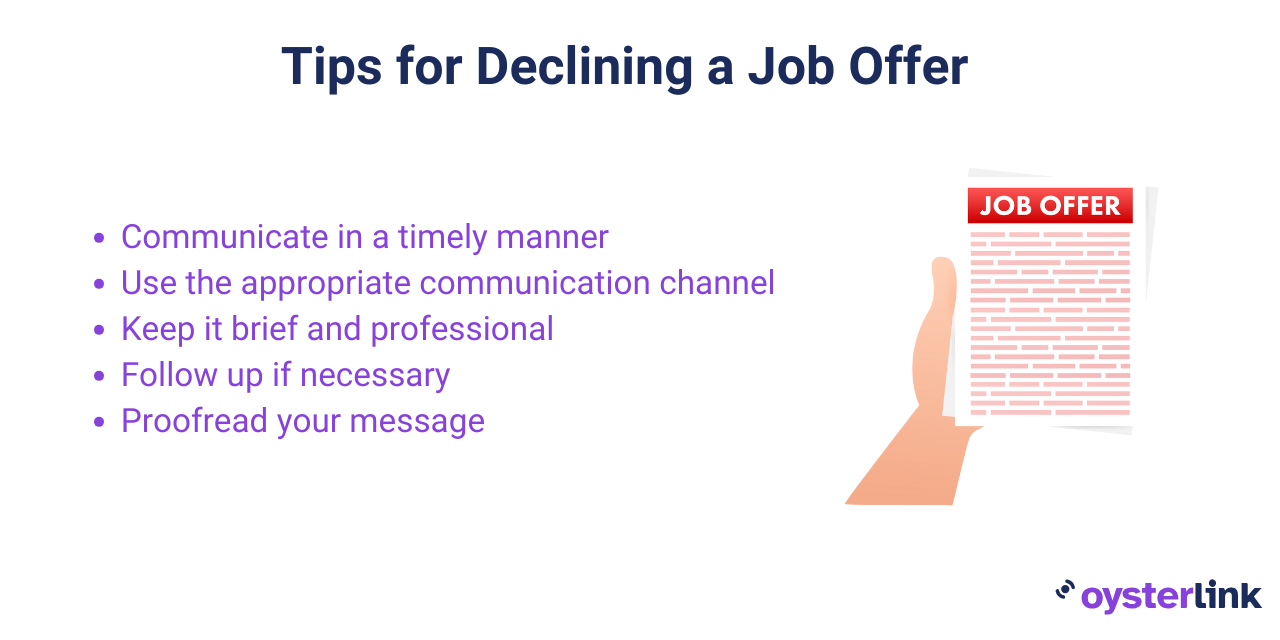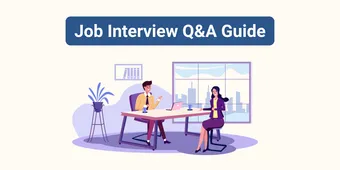Decline Job Offer: 3 Key Takeaways
- 10+ common reasons people decline job offers include better opportunities, salary misalignment, or a mismatch in company culture.
- 5 polite steps to decline a job offer: express gratitude, give a clear reason, stay respectful, offer to stay in touch, and wish them well.
- 3 ready-to-use email templates make it easy to professionally decline a job offer due to a better offer or personal reasons.
To decline a job offer doesn’t have to mean damaging relationships or closing doors.
In fact, how you turn down an offer can strengthen your professional image when done with tact and respect.
In this article, we’ll walk you through the right way to politely decline a job offer, offer helpful tips, and share three free email templates you can use in different situations.
Common Reasons to Decline a Job Offer
Turning down a job offer is never easy, but sometimes it is the right decision for your career and personal well-being.
Here are some of the most common reasons candidates decline a job offer:
- Better offer elsewhere – You received a more competitive offer in terms of salary, benefits or career growth opportunities.
- Salary doesn’t meet expectations – The compensation package is not in line with your skills, experience or financial needs.
- Lack of career growth – The role does not offer clear opportunities for advancement or skill development.
- Company culture mismatch – The work environment, values or leadership style does not align with your preferences.
- Job responsibilities are different than expected – The actual role differs from what was originally discussed in the interview process.
- Long commute or relocation issues – The job location is inconvenient or relocation is not feasible.
- Work-life balance concerns – The role demands excessive hours, travel or stress that does not fit your personal or family needs.
- Instability or job security issues – The company may be experiencing financial struggles, high turnover or an uncertain future.
- Gut feeling or intuition – Something about the role or company does not feel right, even if you cannot pinpoint a specific reason.
- Counteroffer from current employer – Your current company offered a better deal to keep you on board.
Whatever the reason, it is important to decline the offer professionally and respectfully to maintain a positive relationship with the employer for future opportunities.
How To Politely Decline a Job Offer [Step-By-Step]
Declining a job offer respectfully is crucial to maintaining professional relationships and your reputation in the industry.
Here are key points to consider when you need to turn down an offer:
Step 1: Express Gratitude
Always start by thanking the employer for the opportunity and for considering you for the position.
Begin your communication by expressing genuine appreciation for the offer and the opportunity to learn about the company.
Acknowledge the time and effort that their team invested in the hiring process.
This step is important because it leaves a positive impression, demonstrating your professionalism and courtesy, which is important for maintaining a good reputation in your industry.
Example: "Thank you so much for offering me the position of [Job Title].
I greatly appreciate the opportunity to potentially join [Company Name] and am grateful for the time and effort you put into the interview process."
Step 2: Communicate Your Reasons Honestly but Tactfully
Clearly state your reasons for declining the offer but be diplomatic.
Avoid negative comments about the company or the offer.
You may be really impressed with the offer, but you decide to turn down the offer because “it doesn't quite match your career goals” or you have personal reasons.
This step is important because being honest about your reasons for declining shows integrity and transparency.
Example: "I'm really impressed with [Company Name] and the team, but I've decided to turn down the offer because [reason].
Please know I didn't make this choice easily."
Step 3: Offer to Keep in Touch
If you're interested in future opportunities or want to maintain a network connection, suggest staying in contact.
This step is important because it demonstrates your interest in building and maintaining professional relationships, which is a valued trait in any industry.
Example: "I've genuinely enjoyed our interactions and would be happy to stay in touch.
Please feel free to reach out if there are future opportunities or if I can assist in any other way."
Step 4: Offer a Reason if It’s Appropriate
While you're not obligated to provide a reason, doing so can help maintain a positive relationship.
If you choose to share your reason, ensure it's professional and respectful, such as pursuing a different opportunity that aligns more closely with your career goals.
This step is important because it shows respect and professionalism, as you're giving a bit of insight into your decision-making process.
Example: "I wanted to share with you that, after careful consideration, I have decided to decline the offer.
This decision was not easy, but I realized that I am pursuing a different direction in my career that aligns more closely with my long-term goals.
Step 5: Wish the Company Success
Conclude your message by wishing the company and the team success as it shows goodwill and leaves the interaction on a positive note.
This step is important because it shows that you respect the company and its endeavors, keeping the door open for potential future interactions.
Example: "Lastly, I would like to extend my best wishes to you and your team.
I am impressed with the work your company is doing and have no doubt that you will continue to achieve great success.
Expert Tips on How to Decline a Job Offer Gracefully
Whether it's because of personal reasons, or the employer branding, turning down a job offer needs careful handling and a good grasp of the right way to do it.
The best tips to follow when turning down a job are:
- Communicate in a timely manner: Once you've made your decision, inform the employer as soon as possible.
This shows respect for their time and allows them to continue their search for a suitable candidate without unnecessary delay.
- Use the appropriate communication channel: Depending on the nature of your interactions with the company, choose the right medium to communicate your decision.
If your interactions have been formal and via email, it's appropriate to reply in the same manner.
For more casual interactions, a phone call might be more suitable.
- Keep it brief and professional: Your explanation should be concise.
Avoid oversharing or providing unnecessary details.
You could write something like: "I believe it's best for me to explore other opportunities that align more closely with my professional objectives.
Rest assured that this decision is in no way a reflection of your company or the excellent impression I have of your team."
- Follow up if necessary: If you've had extensive interactions with the company, a follow-up thank-you note can be a courteous gesture.
- Proofread your message: Finally, before sending your message, double-check for any typos or grammatical errors to ensure professionalism.

Sample Email Templates to Decline a Job Offer Professionally
The key is to express gratitude, be clear and concise and keep the door open for potential future connections.
Below are three email templates to help you decline a job offer gracefully while maintaining professionalism and respect.
Example 1: Declining Due to a Better Offer
Subject: Thank You for the Opportunity – [Your Name]
Dear [Hiring Manager’s Name],
Thank you for offering me the [Job Title] position at [Company Name].
I appreciate the time and effort you and your team invested in the hiring process.
After careful consideration, I have decided to accept another offer that aligns more closely with my long-term career goals.
This was not an easy decision, as I was genuinely impressed by [Company Name] and the team.
I sincerely appreciate the opportunity and hope our paths cross again in the future.
Please keep in touch, and I wish you all continued success.
Best regards,
[Your Name]
Example 2: Declining Due to Salary Expectations
Subject: Thank You for the Opportunity – [Your Name]
Dear [Hiring Manager’s Name],
I sincerely appreciate the offer for the [Job Title] position at [Company Name] and the time you and your team dedicated to the hiring process.
It was a pleasure learning more about the company and the exciting work you’re doing.
After careful consideration, I’ve decided to decline the offer as it does not align with my salary expectations at this time.
This was a difficult decision, as I have great respect for [Company Name] and the team.
I truly appreciate the opportunity and hope we can stay in touch for potential future collaborations.
Wishing you and your team continued success.
Best regards,
[Your Name]
Example 3: Declining Due to Personal Reasons
Subject: Appreciation for the Offer – [Your Name]
Dear [Hiring Manager’s Name],
Thank you for offering me the [Job Title] position at [Company Name].
I appreciate the time and effort you and your team invested in the interview process, and I truly enjoyed getting to know more about the company.
After much thought, I’ve decided to step away from this opportunity due to personal reasons that require my full attention at this time.
This was not an easy decision, as I was genuinely excited about the role and the prospect of joining your team.
I appreciate your understanding, and I hope we can stay in touch for any future opportunities.
Wishing you and your team all the best moving forward.
Best regards,
[Your Name]
Declining a Job Offer Over the Phone
- Prepare a script: Write down key points you want to cover, such as expressing gratitude and your reason for declining.
- Be concise and professional: Keep the conversation brief and to the point while maintaining a respectful tone.
- Follow up with an email: Send a short email afterward thanking them again and confirming your decision in writing.
Conclusion: Decline a Job Offer the Right Way
Turning down a job offer isn’t always easy, but handling it with professionalism and respect ensures you leave a positive impression.
Whether you’re rejecting an offer due to salary concerns, career alignment or personal reasons, a well-crafted response can keep doors open for future opportunities.
Express gratitude, be clear yet tactful and maintain a professional tone throughout your communication.
The hiring world is smaller than you think, and the way you decline an offer today can impact potential opportunities down the line.










Loading comments...